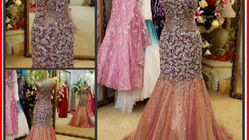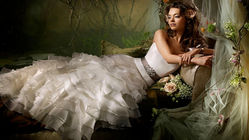Hair & Makeup FAQs Part 1
- YZfashionbridal Inc

- Dec 17, 2013
- 7 min read
Should I pay to have my hair and makeup done by professionals?
If you’re on a tight budget you might prefer to ask a trusted relative or friend to help out on the big day - ideally this will be someone who knows you and your personal style well. Many advise that brides don’t plan to do their own makeup. Your wedding day stress will likely play into how you apply your makeup- meaning that you may not end up looking as beautiful as you could, or you could affect the wedding’s timing. Hiring a professional has many advantages, the most important of which is the effect on you. You will feel much more relaxed – you won’t be worrying about hair or makeup supplies, or trying to carefully apply mascara while your hand shakes with a mixture of nerves and excitement. Instead, you can sit back and enjoy your day. They’ll also have a better eye than ana amateur for what will look best for your face and the particular environment. This is a highly recommended option for busy brides- a little island of pampering and ‘me’ time in a sea of stressed rushing about.
How do I find the perfect hair stylist and makeup artist, and when should I do so?
There are numerous ways to hire such professionals. If your friend or relative is helping you, make sure to book a dry run, or a trial, with them before the wedding. If you’re opting to hire professionals, the best place to start is this very website; we have many resources to help you find your perfect hair stylist and makeup artist, as well as to help you arrange other elements of your wedding too. You may have a specific person or company in mind, or you could ask around for recommendations. Reviews online can also be useful. You may also want to hire a specialist nail artist – it’s worth asking your makeup artist first, as they may include this as part of their service. Ideally, you should book your professionals a few months before your wedding. You should talk to them to make sure that you are happy with them, their plan for you, their rates and any terms or conditions that may apply to the trial or the wedding itself. In the worst case scenario, booking in advance gives you more time to find alternative professionals if it doesn’t work out.
Do I need to have a trial with my hair stylist and makeup artist? If so, when should I have it?
In most cases, you do need to have a trial. Unless you have known your artist for long enough to be confident about the look they will create for you, it is best to check with a trial. If you are planning to wear a headpiece, a veil, earrings or any other accessories, bring these to your trial. The trial is good for planning, as you’ll know how long the process will take – it should be roughly the same amount of time on both your trial and your wedding days. As well as this, your hair may not suit the style you have chosen – if you have a tight bunch and thick hair it could loosen over time. It’s much better to find this out during and after the trial rather than on the day of the wedding. Compare the trials on offer when you search for hair stylists and makeup artists; every company will have different policies and prices for their trials. The trial may cost as much as your wedding makeup, you might need more than one trial with the same or another professional if things go wrong, or if it’s free they may not do everything they would do on at the wedding. This is why you should book your trial for several weeks before the big day. It’s a good idea to shop around, reading the terms and conditions for trials, to find the best deal for your needs.
How I can prepare my skin for the wedding?
Your skin is the base for your wedding day makeup, and some of it will be on show on the big day, so it’s important to ensure your skin is ready. Some gentle exfoliating for your whole body is a great start, and there’s many easy ways. Avoid the loofah – it’s too rough for soft skin. Instead, treat yourself to a body scrub, or use a dry brush - beginning with your feet and working up - before your bath or shower. Exfoliating gloves are widely available, but not recommended for the face. After exfoliating and cleaning, apply body moisturiser to keep your skin looking luminous and feeling its silky best. To exfoliate your face, you need nothing more than an exfoliating facial scrub or cream. Though there are exfoliants which should be used no more than 1-2 times a week, there are more gentle scrubs to be used everyday that both exfoliate and cleanse your skin simultaneously. Exfoliating your skin removes dead skin cells, and therefore cleans your skin, and leaves you with fresh, soft skin that is ideal for makeup application. The morning is the best time to begin this regimen- this is because the body regenerates cells as we sleep. Don’t undergo a facial simply because you assume this is the best clean and will achieve the best results- only rely on facials if you’ve had a number of them in the past, and know what products and specific treatments to undergo and which to avoid. Usually, foreign products are used on your skin, and many times your skin takes several days to rebalance, even if it doesn’t have a severe reaction. And to be honest, the difference a facial ultimately makes isn’t enough to take that risk right before your wedding. There’s no need for anything extreme, just caring for your skin is enough. If you have skin allergies or sensitivity remember to inform your makeup artist, to ensure that they use products suitable for you.
How I can prepare my hair for the wedding?
There are numerous ways to begin preparing your hair for your wedding, and it’s never too early (or too late) to start. Overall, it’s best to ensure your hair is well-cared for. Some of the more obvious causes of hair damage include bleaching products, glue-in extensions, perms and chemical straightening. The best, most fail proof advice to follow here is to do as little further damage to your hair as possible, and keep it as moisturised as possible. This means avoiding the hairdryer and other heat- based styling products, where possible, and perhaps waiting the absolute longest you can between beauty routines that may be a bit damaging, such as bleaching your hair. Consider booking an appointment with your hairdresser/ stylist in the months leading up to your wedding and working out an individualised hair- care routine. For more general hair care, it’s a simple matter of protecting your hair’s condition. Styling hair too often in any way, from ponytails to braids, causes damage to the hair follicles, split ends and affects the structure of the hairs. To prevent this, avoid wearing your hair up when possible - particularly when wet. Any form of highlights or colouring can cause damage, as can over-washing and over-brushing your hair. Your hair needs to develop its own moisture through the production of natural oils; using shampoo, conditioner and even a hair brush too often damages your hair.
I have short hair – do I need extensions for the big day?
Extensions are by no means compulsory for those with short hair. Although long hair often seems necessary for a bride-to-be - due to the flexible nature of long hair – it isn’t for everyone. Don’t feel that you have to have extensions simply because your hair is short, but if you’re keen your best choice is to grow your hair to the desired length. If you don’t have the time or the patience for this, extensions are the way to go. A word of warning, though: your hair needs to be sufficiently long to look as though the extensions will blend naturally (normally a short bob will have enough length). Also, extensions are notoriously expensive (generally costing well over a grand, depending on the particular salon), so you need to be sure that you’ll be significantly happier with longer hair to put in the time, effort and money required. Reliable clip-in extensions are the best choice for a special event such as your wedding and are strongly recommended for brides with thin hair. Those with fine hair should avoid glue-in and sew-in extensions; fusion extensions are another option, but it’s expensive and not suitable for everyone. If in doubt, consult your hairdresser.
When is the best time to have my hair cut for my wedding?
This should be several weeks before your wedding. Some say that as little as a fortnight before is enough time for you to know you are happy with your hair, while others argue that a month or two is best. Everyone is different, but if you get your wedding haircut a month or 6 weeks before your day you can change it if you wish – a week before would not give you the same opportunity.
How can I find the perfect hairstyle for me?
The best way is to do lots of research. But don’t worry - this isn’t as work-intensive as it may sound! Turn on the TV, nip to the shops, go for a walk, surf the net or flick through a magazine for hair-based inspiration. A good idea is to pick a celebrity you feel you resemble, and see what haircuts you like on them. If you’re talented at drawing or animating you could sketch out an idea then show it to your hairdresser and your hair stylist. There are also computer programs and apps which can show you how your face will look with your desired haircut. These can be free or require payment and vary in quality. Just have fun experimenting with ideas, and you can always discuss it with your family, friends and hair professionals when you’ve made a list of your favourites.















































Comments